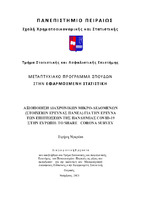Αξιοποίηση διαχρονικών μικρο-δεδομένων (στοιχείων έρευνας πάνελ) για την έρευνα των επιπτώσεων της πανδημίας Covid-19 στην Ευρώπη : το SHARE Corona Survey
Utilisation of panel micro data to study the impact of Covid-19 in Europe : the SHARE data

View/
Keywords
Επιπτώσεις ; ΠανδημίαAbstract
This thesis aims to investigate the existence of a correlation between vulnerability
(health and economic) and protection measures in people over 50 years old during the
pandemic. For this purpose, information from the eighth wave of the pan-European
SHARE survey concerning Covid-19 (Survey of Health, Aging and Retirement in
Europe) is used. The characteristics examined are demographic, economic (economic
vulnerability) and health (health vulnerability). The first chapter presents definitions
regarding the concept of vulnerability and general information about the Covid-19
pandemic and its connection to pre-existing diseases. In the second chapter we will
emphasize how each country dealt with Covid-19. We see the measures taken by the
European countries and Israel as well. As our data was taken from SHARE the next
chapter refers to it. Starting with what SHARE is and we also talked about its
advantages. The SPSS statistical package is used to analyze the data of the SHARE
survey. In particular, the fourth chapter examines through the two-dimensional analysis
whether and to what extent vulnerability is related to the adoption of protection
measures. The fifth chapter is the conclusion of this work, in which the main
conclusions of the research are recorded. More specifically, women have a lower
probability of taking protective measures compared to men, and people whom we
characterized as economically vulnerable to covid 2020 and 2021 have a lower relative
probability of taking protective measures compared to people who were not
economically vulnerable, while those who were vulnerable (in terms of health) also had
a higher relative probability of taking protective measures.


